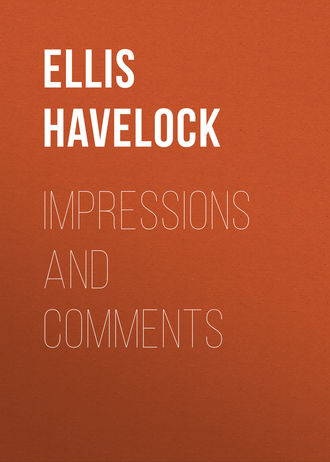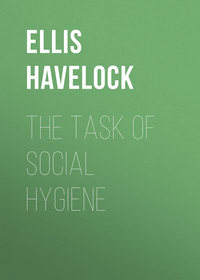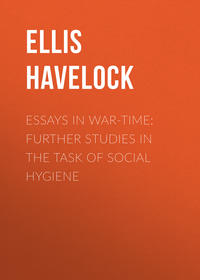 полная версия
полная версияImpressions and Comments
He can indeed be sent to the Home for Defectives. That way lies perhaps the solution of our Social Problem. The pessimist may cry out at the size of the Homes that his fears portend. Yet, even at the worst, who will deny that it is better, beyond comparison better, that even only a minority of Mankind should be free—free to develop in the sun and free to climb to the sky and free to be damned—than that the whole world should be made one vast Home for Moral Imbeciles?
December 4.—There is nothing amid the restlessness of the world that one lingers over with such tender delight as Flowers and Gods. What can be more beautiful than Flowers and Gods?
Flowers are of all things most completely and profusely the obvious efflorescence of loveliness in the whole physical world. Gods are of all things the most marvellous efflorescence of the human psychic world. These two Lovelinesses, the Loveliness of Sex and the Loveliness of Creation, bring the whole universe to two polar points, which yet are in the closest degree resemblant and allied. In China, the land of flowers, flowers are nowhere, it is said, so devoutly cultivated as in the monasteries of Buddha. For flowers are constant symbols of the Gods and instruments of worship, and when the Gods take fitting shape it is a shape that recalls to us a flower. Of all Gods made visible none is so divine as Buddha (one's thoughts constantly return to the most delectable of museums, the Musée Guimet), and the Buddha of finest imagery is like nothing so much as a vast and serene flower, a great lotus that rises erect on the bosom of Humanity's troubled lake.
And perhaps it is because men and women are in function flowers and in image gods that they are so fascinating, even enwrapped in the rags, physical and metaphysical, which sometimes serve but to express more genuinely the Flower-God beneath.
December 11.—Quid hoc ad aeternitatem? So, we are told, an ancient holy man of the early Christian world was wont to question everything that was brought before him. It is a question that we cannot too often ask to-day. I assume that we understand "Eternity" in its essential Christian sense (on which F. D. Maurice used to insist) as referring not to the Future, but to the Everlasting Present, not to Time but to the Things that Matter.
There are not only far too many people in the world, there are far too many things. Prodigality is indeed the note of Nature. And rightly so. But Economy is the note of Man. Rightly also. For Nature has infinite lives to play with. Man has only one life.
Public Hygiene is nowadays much concerned with the edification of large and effective Destructors of Refuse. It is well. They can scarcely be too large or too effective. Large enough to deal with all the Dreadnoughts of the world and most of its books. And so much else! Let us imitate the Rich, if that seems well, in the quality of our possessions. But in their number let us imitate the Poorest. So in our different human way we may reach towards the Simplicity of Nature.
And let us never grow weary of repeating afresh the stern challenge of that old champion of the Higher Sabotage: Quid hoc ad aeternitatem?
December 15.—"There has always been the same amount of light in the world," said Thoreau. One sometimes doubts it. Perhaps one fails to recognise the "bushels" it is hidden under. One need not fear that it is becoming less. One must not hope that it will become more.
I wonder whether Mazzini, could he revisit the Italy which reveres his memory, would really find more light there than of old? There was the Italy that Stendhal loved, the Italy that produced Mazzini, who went out into the world as its most inspired prophet and sought so earnestly to regenerate it. And here is the duly regenerated Italy which has gone after what it considers glory in Tripoli and systematically starved its own children, and sent its inspired prophet Marinetti into the world, as it once sent Mazzini. The un-regenerate Italy which produced Mazzini or the regenerated Italy which produced Marinetti—which is it, I wonder, that most tries our faith in Thoreau's creed, "There has always been the same amount of light in the world"?
December 28.—Lévy-Bruhl, a penetrating and suggestive moralist, has written a book, Les Fonctiones mentales dans les sociétés inférieures, in which he seeks to distinguish between a primitive pre-logical rationality, not subject to the law of contradiction, and a later logical rationality, which refuses to admit contradictions. He points out how much wider and more fruitful is the earlier attitude.
There seems something in this distinction. But it may well be dangerous to formulate it too precisely. No hard and clear-cut distinctions can here be made. The logical method can scarcely supersede the pre-logical method, for it covers less ground and is more exclusive, it can never be the universal legatee of the pre-logical method. We are probably concerned with two tendencies which may exist contemporaneously, and each have its value. It may even be said that the pre-logical and the logical temperaments represent two types of people, found everywhere even to-day. Some observers, like Heymans in his thoughtful book on the psychology of women, have noted how women seem often to combine contradictory impulses on an organic basis, but they have not always observed that that gift may be as inestimable as it is dangerous.
In this connection it is interesting to recall that Harnack, the great historian of Christian dogma, while asserting that Athanasius in combating Arianism saved Christianity, yet asserts with equal emphasis that the doctrine of Athanasius embodied a mass of contradictions which multiply as we advance. He might have added that that was why it was vital. Life, even in the plant, is a tension of opposing forces. Whatever is vital is contradictory, and if of two views we wish to find out which is the richest and the most fruitful we ought perhaps to ask ourselves which embodies the most contradictions.
December 31.—"The heavens shall be rolled together as a scroll, and all their host shall fade away, as a leaf fadeth off the vine, and as a fading leaf from the fig-tree." So the world seemed made to Isaiah, and that light airy way of accepting it may linger in one's mind all the more persistently because of its contrast with the heavy solemnity of the Hebraic genius. So it is with all these men of creative genius, whatever nation they belong to. Wherever Man flowers into Genius, wherever, that is to say, he becomes most quintessentially Man, he can never take the world seriously. He vaguely realises that it is merely his own handiwork, his own creation out of chaos, and that he himself transcends it. So for the physicist of genius the universe is made up of holes, and for the poet of genius it is a dream, and even for the greatest of these solemn Hebraic prophets it is merely a leaf, a fading leaf from the fig-tree.
Qualis artifex pereo! It may well be the last exclamation of the last Son of Man on the uninhabitable Earth.
THE END


